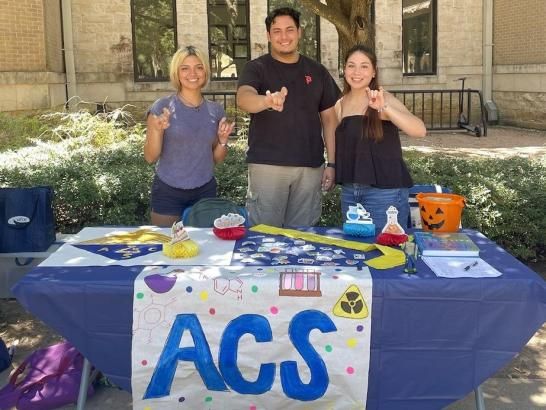Help Solve Crimes by Using Chemistry to Analyze Evidence
Majoring in Forensic Chemistry will give you a solid background in chemistry, forensics and criminal justice that you can apply to fields in law enforcement, public safety or private enterprise. You’ll learn the fundamentals of crime scene investigation and how to collect, analyze and present evidence. You’ll graduate ready to use chemistry to uncover the truth and keep communities safe.
Why earn your Forensic Chemistry degree at St. Edward’s?
Whether you want to pursue a career with police or fire departments, the coroner’s office, the military, the FBI or CIA, bomb squads or private labs — or pursue a graduate degree in forensic chemistry — one thing is certain: The advantages of your St. Edward’s education will prepare you to succeed. You’ll find opportunities in and outside the classroom to learn, give back and achieve your goals. And your mentors will support you every step of the way.
Build relationships with your professors
You’ll learn in small classes taught by dedicated professors who make a point of getting to know you and becoming your trusted advisors. They’ll help you identify and focus on your goals, and provide guidance and insight during your college years and after you graduate.
Conduct research
You’ll have the opportunity to engage in faculty-mentored research, present your work at professional conferences, and submit your findings for publication.

Develop your career path as a chemist
Love chemistry but unsure what you would like to do with your degree? The Chemistry department’s annual guest speaker series connects you with professionals in the field. Learn firsthand from chemists in academia, industry and government agencies about their professional journey as a chemist. It’s an excellent opportunity to network and gain firsthand knowledge about the field. In addition, gain valuable experience as a teaching assistant for a laboratory course where you’ll enhance your benchwork, leadership and teamwork skills — all while helping fellow students

Get involved in the American Chemical Society student chapter
The American Chemical Society (ACS) student chapter is a professional organization focused on enhancing student networking with professionals in the field, exploring careers in chemistry, and building a sense of community with people who love forensic chemistry as much as you do. The ACS student group works closely with the Department of Chemistry in coordinating its annual guest speaker series and volunteering for chemistry-focused community events.

Reap the Rewards of Austin
Austin is a fast-growing technology hub and emerging center of science research and innovation. As a Forensic Chemistry major, you can explore career paths and practical application of your studies through internships and interactions within the greater Austin community.
What do our graduates do?
Forensic Chemistry majors advance to a variety of careers and graduate schools from St. Edward’s. Here’s a sample:
- Forensic scientist at the Texas Department of Public Safety
- Gas and chemical project manager at Freescale Semiconductors
- Project manager at NXP Semiconductors
- Master’s student at the University of Albany
Explore Details About a Degree in Forensic Chemistry
Major Requirements: The Bachelor of Science in Forensic Chemistry requires 69 hours of major courses, which include a combination of introductory coursework, developmental chemistry, labs and research methods.
General Education Requirements: In addition to the major program requirements, all students must satisfy the general education requirements. Talk with your success coach and faculty advisor about which courses are right for you.
View and download the full degree plan for our Forensic Chemistry major (PDF).
A few examples of courses students in this major take:
- Crime Scene Investigation – Examine, learn, understand and employ the techniques of crime scene investigation. The objective is to teach the fundamentals of crime scene investigation.
Students should be able to assess any crime scene and determine proper procedures - Instrumental Analysis – A study of some of the modern instrumental methods including
atomic and molecular spectroscopy, analytical separations, mass spectrometry, magnetic resonance spectrometry and other salient techniques. - Forensic Chemistry – Major facets of forensic analytical chemistry will be covered, including drug analysis, forensic toxicology, trace analysis, and arson and DNA typing. The use of Bayesian probability in the evaluation of guilt and innocence will also be covered. Real-world case studies will be used to illustrate the application of these principles.
The Department of Chemistry also offers BS degrees in Chemistry, Biochemistry and Environmental Chemistry.
What You Will Learn
Forensic Chemistry courses include a combination of introductory coursework, developmental chemistry, labs and research methods, and support courses in criminal justice.
- Through classroom studies, lab work, field experiences and research, you’ll develop an understanding of how to collect, organize and interpret chemical data.
- Learn the fundamentals of crime scene investigation, and analyze blood and tissue samples to identify DNA or run toxicology screens.
- Understand how to verify the chemical composition of drugs taken as evidence and how to detect chemicals associated with explosives, firearms or toxic substances.
Skills You Will Gain
As a Forensic Chemistry major, you’ll cultivate a range of skills that prepare you to excel in the workplace. You’ll be able to:
- Search, access, contextualize and effectively summarize readings of discipline-specific literature.
- Apply appropriate experimental techniques and instruments in the context of designing and executing an experiment.
- Use quantitative tools for data collection and analysis.
- Explain the purpose of general laboratory safety guidelines and their implementation in various lab settings.
- Communicate the findings of independent research in a manner appropriate to the audience, including oral presentations and the writing of experiments, research manuscripts, poster presentations and research proposals.
- Demonstrate an ability to collaboratively arrive at a common goal within a team.
Research
You’ll perform research with cutting-edge instrumentation — St. Edward’s is proud to be considered one of the best-equipped and best-funded small college chemistry departments in the country. We’ve been highly successful in securing external funding in support of an advanced curriculum, modern laboratory instrumentation and undergraduate research.
Departmental and Research Funding
In addition to an ongoing research grant from the Robert A. Welch Foundation, the Department of Chemistry has secured curricular and equipment grants from the National Science Foundation, the Keck Foundation and the Educational Advancement Foundation.
The Chemistry department is grateful for the ongoing gift of the Lewis fund, which supports student research. Given in memory of Dr. JD Lewis, longtime faculty member in the Chemistry department, this fund provides support for summer six-week and eight-week student research experiences
Scholarships
- In addition to performing research over the academic year in one of the faculty-led research groups, students may apply for participation in the Chemistry Department’s full-time summer research program. The summer program is fully funded and successful applicants receive competitive student stipends.
- Students in chemistry-related majors at St. Edward’s may apply for Welch Foundation undergraduate research scholarships or Lewis scholarships — including a summer scholarship that provides a six-week or eight-week stipend to conduct research.
- Apply for a summer research experience for undergraduates [REU] at local and national universities where you can gain experience studying different subfields of chemistry and focus on your career direction.
Summer Research Experiences for Undergraduates (REU) include:
- The University of Texas at Austin
- Texas State University
- Baylor University
- University of Texas at San Antonio
- University of North Carolina
- Michigan State University
- University of Nebraska
- University of Michigan
- University of Mississippi
- North Carolina State University
- Boston University
Conferences and Presentations
- Students are encouraged to present their results at professional meetings, such as regional and national meetings of the American Chemical Society and the Texas Academy of Science.
- Students also have the opportunity to present their research at the annual Lucian Symposium [fall semester] and SOURCE Symposium [spring semester] on the St. Edward's campus.
At St. Edward’s, our faculty are outstanding scholars, thought leaders, teachers and mentors who bring energy and enthusiasm to our vibrant learning community. They take pride in getting to know you, helping you achieve your goals and celebrating your successes.
View a list of our faculty members and their contact information on the Department of Chemistry webpage.
